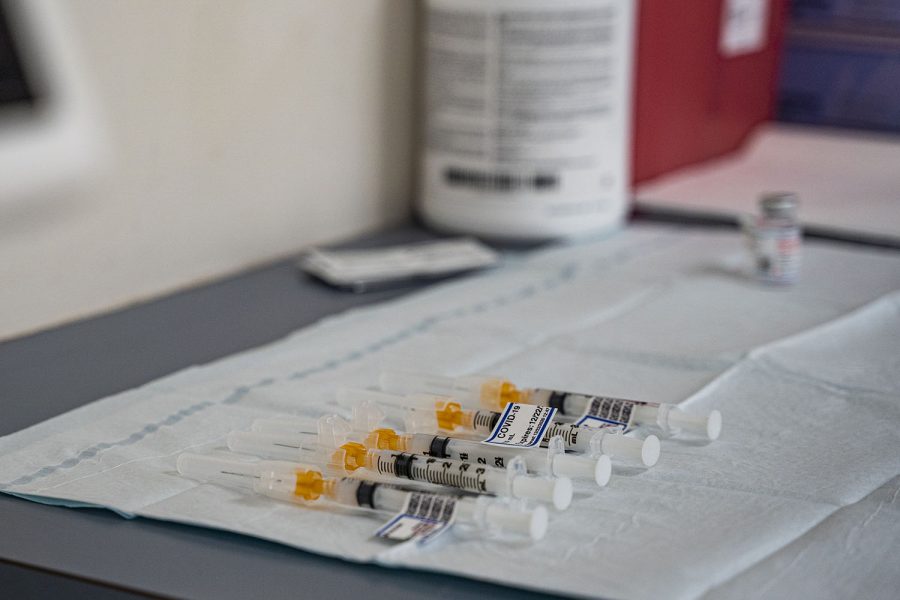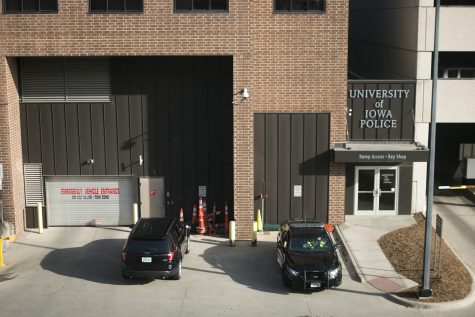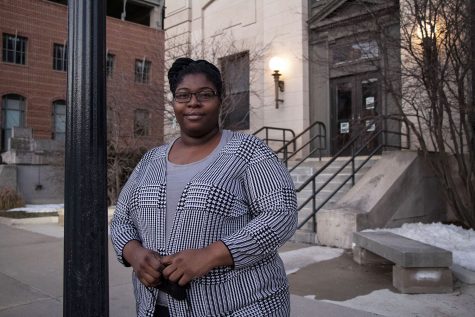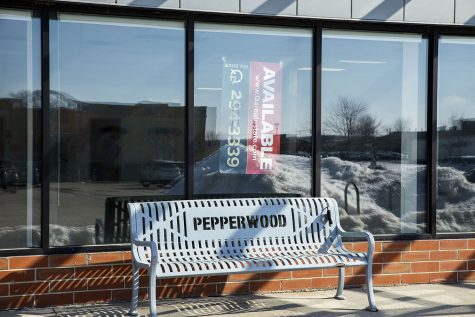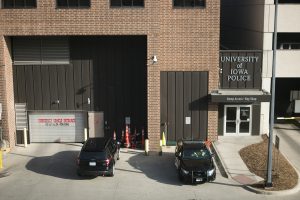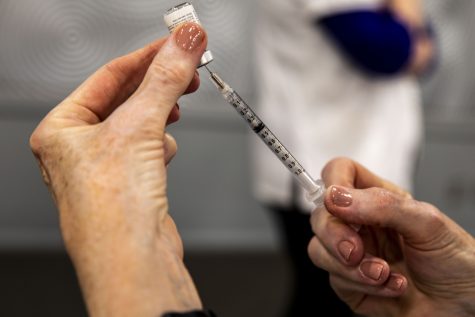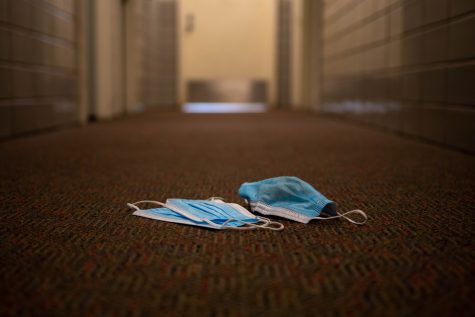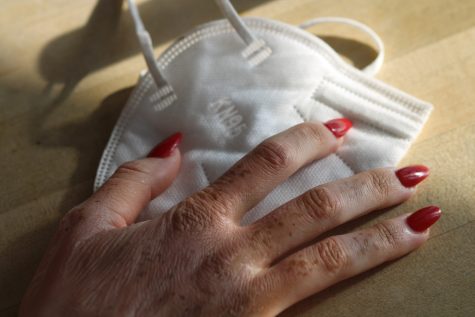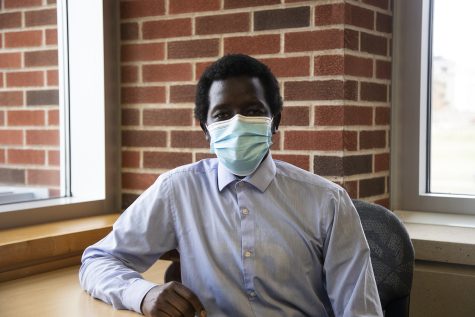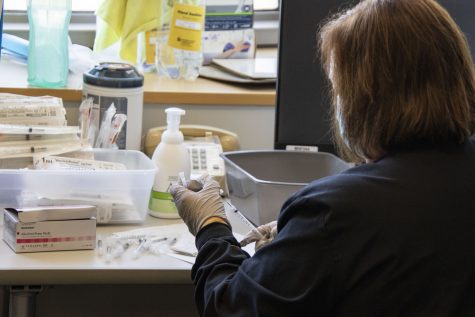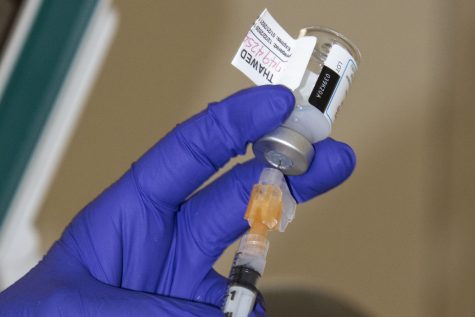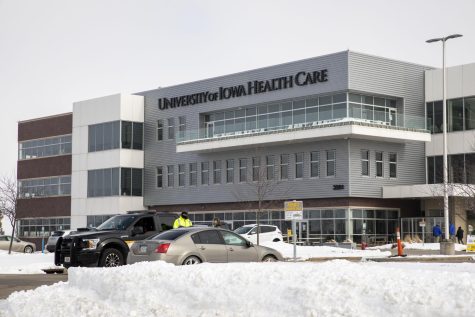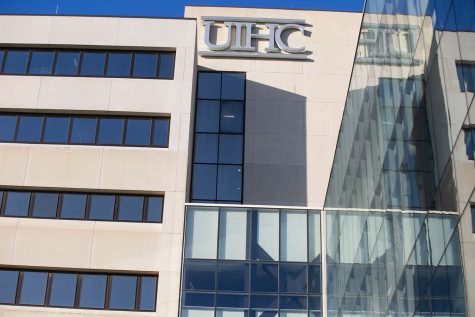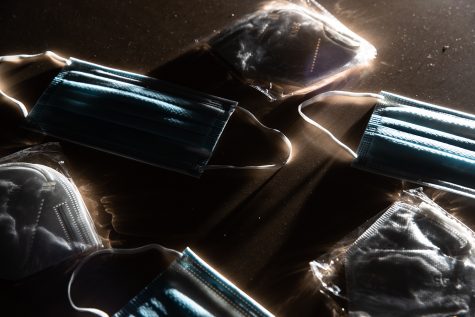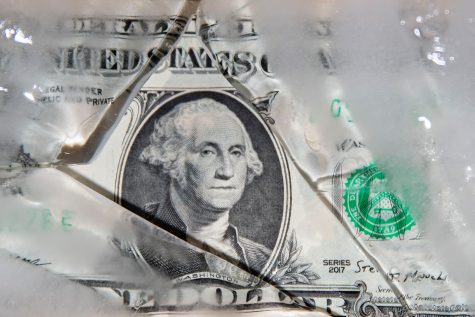University of Iowa vaccine experts say don’t wait on a brand
This week, the FDA issued emergency-use authorization for a single-dose Johnson and Johnson COVID-19 vaccine. Iowa expects to receive 25,600 doses.
Syringes for the COVID-19 vaccine lay on a counter at the VA Medical Center in Iowa City on Tuesday, Dec. 22, 2020. The center received the Moderna vaccine for its employees.
March 2, 2021
Public health experts in Johnson County recommend people get one of the three FDA-approved COVID-19 vaccine as soon as it’s available, regardless of brand.
On Feb. 28, the U.S. Food and Drug Administration issued an emergency use authorization for the third vaccine for the prevention of COVID-19. Iowa will receive 25,600 doses of the Johnson and Johnson vaccine, according to an Iowa Department of Public Health release. It’ll be allocated to 17 Iowa counties that have larger 1B priority group populations — not including Johnson County. Local health agencies are waiting on federal and state allocations of the new vaccine, which is expected to speed up distribution, but vaccine leaders say all three COVID-19 vaccines prevent almost all cases of serious COVID-19 illness.
The Janssen vaccine from Johnson and Johnson was approved after a thorough analysis of the data, including an analysis of 43,783 participants in a placebo-controlled study in South Africa.
With guidance from the Centers for Disease Control and Prevention and the FDA, Executive Dean of the University of Iowa Carver College of Medicine Pat Winokur, who is UI Hospital and Clinics’ lead vaccine researcher, said UIHC plans to continue distributing vaccines as they become available to eligible populations.
According to UIHC, 10,349 employees have received the first and second COVID-19 vaccine doses.
Because of Johnson and Johnson introducing a single-dose vaccine, as opposed to the two-dose Pfizer and Moderna vaccines, some have speculated that the older vaccines could only require one dose to be effective.
While this may turn out to be the case, Winokur said, there’s not enough data to support this speculation.
Winokour said the antibody titers, the measurement of how many antibodies a vaccine has produced, were not robust after just one dose of the Pfizer or Moderna vaccines.
“They were good enough to provide some protection over that short time frame, but they were not as good as titers you get after natural infection or the titers you get after the second dose of the vaccine,” Winokur said.
Researchers are still looking at the requirements for the number of antibodies necessary to prevent the spread of COVID-19 and stop infection, so they don’t know the numbers yet, Winokur said.
Johnson County Public Health Community Health Division Manager Sam Jarvis said the reason the Johnson and Johnson vaccine only requires one dose is because of the way that manufacturers studied it in South Africa.
The Moderna and Pfizer vaccines required a two-dose series when researchers studied the efficacy, while Johnson and Johnson only required one, Jarvis said.
Jarvis said a single-dose vaccine would help distribute the vaccine to more people because it eases logistical complications.
“[One dose] certainly cuts down on the barriers to getting the vaccine: time, transportation, and access, which are three important things in our mind when we’re planning how to distribute the vaccine,” Jarvis said.
Although the data is promising, Winokur said she expects Johnson and Johnson to require two doses of the vaccine in the future.
“Johnson and Johnson is going to be a little harder because their antibody titers are not as good as the coronavirus natural infection,” Winokur said. “I’m suspicious that they may end up needing a second dose.”
Additionally, Winokur recommends people get the vaccine even if they’ve been infected with COVID-19.
“The antibody titers after COVID-19 are not as high as the antibody titers that are generated after vaccination with the Pfizer and Moderna vaccines,” Winokur said. “We don’t know exactly what’s protected, but we know more is always better.”
Even if one vaccine has a lower efficacy rate than others, UIHC Director of Division of Infectious Disease Dan Diekema said in a video on Friday that the vaccine is still effective.
“If the vaccine makes it through to emergency-use authorization by the FDA, that means it’s extremely effective, [and] it has a very tolerable side effect profile,” Diekema said. “It’s going to basically be 100 percent effective at preventing you from being admitted to the hospital or dying from COVID-19.”
While the Johnson and Johnson vaccine has a 72 percent efficacy rate after one dose, compared to the nearly 95 percent of Moderna and Pfizer after two doses, Winokur said it’s important to get whatever vaccine is available.
“The more people that get vaccinated, the more people that are going to be better off,” Winokur said. “They’re going to be protected from severe disease and they’re going to be protected from hospitalizations.”



